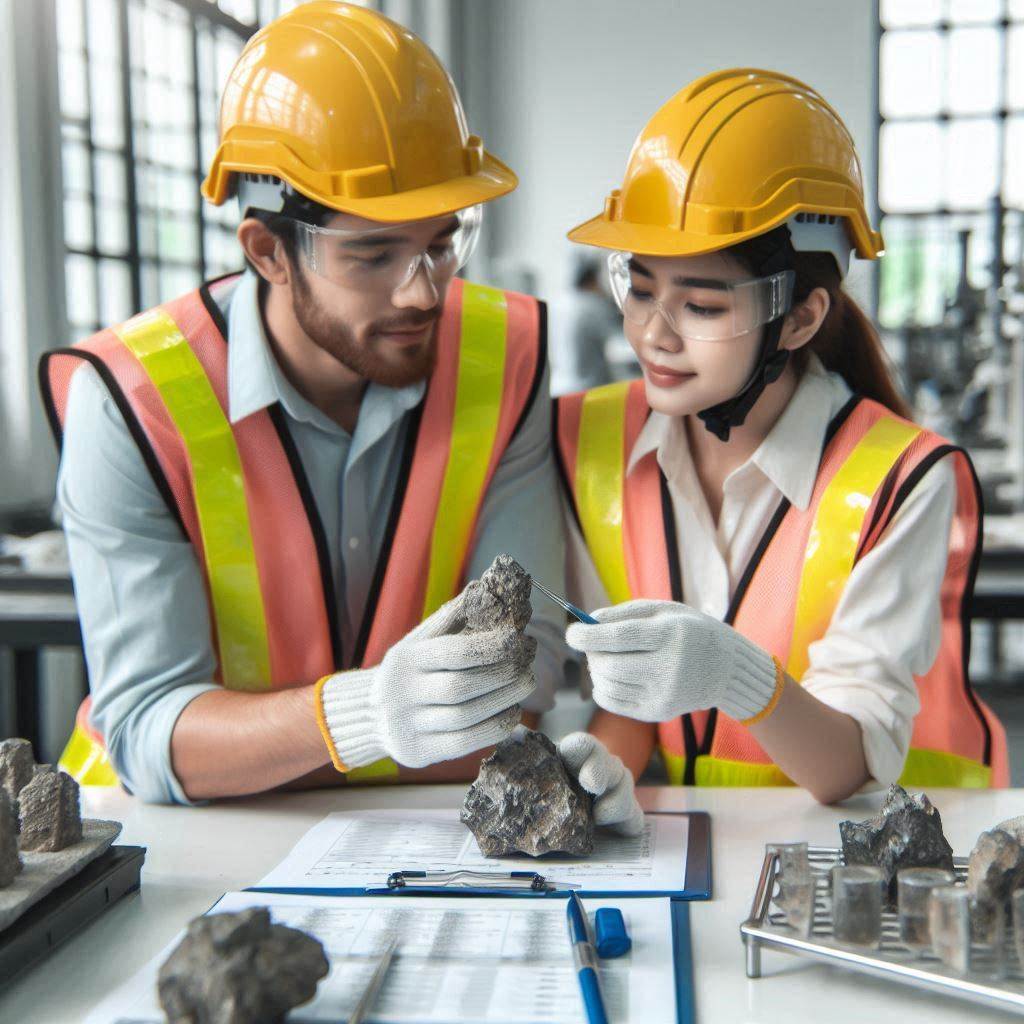Introduction
Geological technicians play a crucial role in the exploration and analysis of Earth’s resources.
They support geologists by collecting and analyzing geological samples.
Their work includes operating equipment, conducting field surveys, and recording data.
The accuracy of their tasks directly impacts resource assessment and environmental safety.
Securing a job as a geological technician often hinges on a successful interview.
An effective interview can demonstrate your technical skills and problem-solving abilities.
It allows you to showcase your knowledge of geological principles and your familiarity with industry practices.
The interview process also provides an opportunity to communicate your enthusiasm for the field and your fit for the role.
This blog post aims to guide you through the interview preparation process.
We’ll cover essential tips and strategies to help you stand out.
From understanding common interview questions to demonstrating your practical skills, we‘ll provide actionable advice to boost your confidence.
Preparing thoroughly can make a significant difference in your performance and increase your chances of landing the job.
By following these guidelines, you’ll be better equipped to present yourself as a capable and knowledgeable candidate.
You’ll learn how to highlight your relevant experience and expertise effectively.
With the right preparation, you can make a strong impression and move one step closer to starting your career as a geological technician.
Research the Company
Researching the company you are interviewing with is a crucial step in preparing for a geological technician interview.
It is important to have a good understanding of the company’s background, values, and mission to show that you are genuinely interested in working for them.
Importance of understanding the company’s background and values
Knowing the history and core values of the company will help you demonstrate that you are a good fit for the organization.
It also shows the interviewer that you are proactive and take the opportunity seriously.
How to find information about the company online
Start by visiting the company’s official website.
Look for information about their products or services, company culture, recent achievements, and any other relevant details.
You can also check their social media profiles for more insights.
Additionally, search for news articles or press releases about the company to stay updated on their latest developments.
Tips on tailoring your answers to align with the company’s goals and culture
Once you have gathered information about the company, tailor your answers during the interview to showcase how your skills and experiences are aligned with the company’s goals and values.
Highlight specific examples that demonstrate your fit with their culture.
For example, if the company prides itself on innovation, share a project where you implemented a creative solution to a geological challenge.
If they prioritize teamwork, talk about a successful collaboration experience you had in a previous role.
By conducting thorough research on the company and customizing your responses accordingly, you will impress the interviewer and increase your chances of landing the job as a geological technician.
Remember, preparation is key to success in any interview situation.
Review Common Interview Questions
List of Common Interview Questions for Geological Technician Roles
Understanding the types of questions you might face can help you prepare effectively. Common interview questions for geological technician roles often focus on problem-solving scenarios.
- Describe a time when you encountered a problem with geological equipment. How did you resolve it?
- How do you handle unexpected results in geological data?
- Explain a situation where you had to troubleshoot a complex issue. What was your approach?
Tips on How to Structure Your Responses Effectively
When responding to questions, structure your answers to showcase your problem-solving capabilities clearly.
Use the STAR method (Situation, Task, Action, Result) to keep your responses focused:
- Situation: Start by outlining the problem or challenge you faced.
- Task: Describe what needed to be done to resolve the issue.
- Action: Explain the steps you took to address the problem.
- Result: Highlight the outcome of your actions and any positive impact.
Importance of Practicing Your Answers Beforehand
Practicing your responses is crucial.
Rehearsing answers to common questions helps you articulate your problem-solving skills more confidently and clearly.
It also prepares you for handling unexpected questions or scenarios.
Practice with a friend or mentor who can provide feedback on your responses.
This preparation helps you present your problem-solving abilities effectively and handle the interview smoothly.
Generally, problem-solving skills are vital for geological technicians.
By preparing for common interview questions, structuring your responses with the STAR method, and practicing your answers, you can demonstrate your problem-solving abilities effectively.
This preparation will not only highlight your suitability for the role but also make a strong impression on your interviewer.
Read: Field vs. Office Work in Surveying and Mapping
Showcase Technical Skills
Overview of the Technical Skills Required for the Role
Geological technicians need a range of technical skills.
Proficiency in data analysis, geological mapping, and field sampling is crucial.
Familiarity with geological software and tools enhances your ability to perform detailed analysis.
Understanding geological principles and methods is also essential for accurate work.
These skills enable technicians to tackle challenges and contribute effectively to projects.
Tips on How to Highlight Your Experience and Expertise in These Areas
To showcase your technical skills, use specific examples from your past experiences.
Start by detailing how you used these skills in previous roles.
For instance, if you worked with geological software, explain the types of projects you handled.
Highlight any complex data analysis tasks you performed and the outcomes.
Provide examples of how you applied your knowledge of geological principles in real-world situations.
Discuss projects where you used field sampling techniques and the results you achieved.
Emphasize any innovative methods you developed or implemented.
Importance of Providing Specific Examples of How You Have Used These Skills in the Past
Providing specific examples is crucial during an interview.
It demonstrates your practical experience and problem-solving abilities.
For example, if you solved a data discrepancy, describe the problem, your approach, and the resolution.
This shows your ability to handle similar issues in the future.
Another example might be a project where you used geological software to create detailed maps.
Discuss the process you followed and the impact of your work.
Specific examples help interviewers understand how you apply your skills in practical situations.
Read: Networking Tips for Surveying and Mapping Professionals
Prepare for Behavioral Questions
Explanation of Behavioral Interview Questions and Their Importance
Behavioral interview questions assess how you handle real-world situations.
They focus on past experiences to predict future performance.
Interviewers ask about specific scenarios where you demonstrated problem-solving skills.
These questions are important because they reveal your approach to challenges and your ability to think critically under pressure.
Tips on How to Use the STAR Method to Structure Your Responses
The STAR method is a structured way to answer behavioral questions.
It stands for Situation, Task, Action, and Result.
Start by describing the Situation or Problem you faced.
Next, explain the Task or Objective you needed to achieve.
Then, detail the Actions you took to address the issue.
Finally, describe the Result or Outcome of your actions.
Using STAR helps keep your answers clear and focused.
Importance of Providing Concrete Examples of Past Experiences
Concrete examples make your answers more compelling.
They show that you have practical experience in problem-solving.
When discussing past experiences, be specific about the problems you faced and the solutions you implemented.
This approach demonstrates your capability and readiness for the role.
For instance, if asked about dealing with a faulty piece of equipment, describe how you diagnosed the problem.
Explain the troubleshooting steps you followed and how you fixed or replaced the equipment.
Highlight the outcome and any improvements made.
This detailed approach shows your problem-solving skills and technical expertise.
Prepare for hypothetical scenarios by practicing responses to common questions.
Interviewers may present a geological problem and ask how you would handle it.
Think about the steps you would take and the factors to consider.
For example, if given a scenario involving unexpected soil sample results, describe how you would recheck the samples, verify the results, and adjust your analysis methods.
Show that you can adapt and think critically.
Read: Recent Trends in Surveying and Mapping Technologies

Demonstrate Problem-Solving Abilities
Discussion on the Importance of Problem-Solving Skills in a Geological Technician Role
Problem-solving skills are vital for geological technicians.
These professionals face complex challenges related to geological data, fieldwork, and environmental conditions.
They must interpret data accurately, develop solutions, and make decisions based on their findings.
Without strong problem-solving skills, addressing unexpected issues and ensuring precise results becomes difficult.
These skills help technicians adapt to new information, troubleshoot equipment, and improve methods for data collection and analysis.
Tips on How to Showcase Your Ability to Think Critically and Analytically
To stand out in your interview, you must effectively demonstrate your problem-solving skills. Here are some tips to showcase your ability to think critically and analytically:
Transform Your Career Today
Unlock a personalized career strategy that drives real results. Get tailored advice and a roadmap designed just for you.
Start NowUse Specific Examples Provide concrete examples from your experience.
Share detailed stories of how you tackled challenging problems in previous roles.
Describe the issue, your approach to solving it, and the outcome.
This approach helps interviewers see how you apply your skills in real-world scenarios.
Detail Your Analytical Process Explain how you approach data analysis.
Discuss how you collect and organize data, identify patterns, and interpret results.
Show how you use this information to form hypotheses and test them.
This demonstrates your ability to handle complex data and make informed decisions.
Highlight Decision-Making Abilities Illustrate how you make decisions based on your analysis.
Discuss how you weigh different options, assess risks, and choose the best course of action.
Your ability to make sound decisions under pressure is a key aspect of problem-solving.
Examples of How to Approach Hypothetical Scenarios During the Interview
Scenario 1 Conflicting DataYou receive conflicting geological data from two sources.
How do you resolve this? Start by verifying the accuracy of each data source.
Describe how you would cross-check data, consult with colleagues, and use additional resources to determine the correct information.
Scenario 2 Unexpected Anomaly: You discover an unexpected geological anomaly in the field.
What steps do you take? Explain how you would investigate further by gathering additional samples, consulting with experts, and analyzing the anomaly’s implications.
Show your systematic approach to understanding and addressing the issue.
Read: Safety Tips for Field Surveying Technicians
Dress and Act Professionally
Importance of Making a Good First Impression Through Professional Attire
Professional attire plays a crucial role in making a strong first impression.
Dress appropriately for the interview to convey seriousness and respect for the opportunity.
Opt for business attire that is clean, well-fitted, and suitable for the industry.
This will help you present yourself as a competent and professional candidate.
Tips on Body Language and Communication Skills During the Interview
Body language and communication skills are vital during an interview.
Maintain good posture, make eye contact, and use confident gestures.
These non-verbal cues can significantly impact how your responses are perceived.
Speak clearly and articulate your thoughts concisely.
This demonstrates your confidence and professionalism, enhancing your overall presentation.
Advice on How to Convey Your Enthusiasm and Passion for the Role
Conveying enthusiasm and passion for the role is key to making a lasting impression.
Express genuine interest in the position and the company.
Discuss aspects of the job that excite you and align with your career goals.
Your enthusiasm will resonate with the interviewer and highlight your commitment to the role.
In summary, problem-solving skills are crucial for geological technicians.
Showcase these skills by sharing specific examples and practicing responses to hypothetical scenarios.
Additionally, making a good first impression through professional attire, displaying positive body language, and conveying your passion for the role will enhance your interview performance.
By focusing on these areas, you‘ll present yourself as a strong candidate for the position.
Delve into the Subject: Day in the Life of an Engineering Technician: Insights
Ask Thoughtful Questions
Asking questions during a geological technician interview is crucial for several reasons.
First, it shows your interest in the position and the company.
Second, it allows you to gather more information about the role, team dynamics, and company culture.
Lastly, asking questions demonstrates your critical thinking skills and ability to engage in meaningful conversations.
Examples of Insightful Questions to Ask the Interviewer
- Can you tell me more about the day-to-day responsibilities of a geological technician in this role?
- How does the company typically support professional development for employees in this position?
- What do you think sets successful geological technicians apart in your team?
- Can you walk me through a recent project that the geological team worked on?
Tips on How to Demonstrate Your Interest in the Company and the Role
- Research the company’s background, values, and recent projects before the interview.
- Connect your skills and experiences to the specific requirements of the geological technician role.
- Show enthusiasm and curiosity about the opportunity to work with the interviewer and their team.
- Ask follow-up questions based on the information shared by the interviewer to demonstrate active listening.
By asking thoughtful questions and engaging in meaningful conversations during your geological technician interview, you can showcase your interest in the role, company, and industry.
Remember to prepare a list of insightful questions beforehand and be ready to engage with the interviewer to make a positive impression.
Learn More: Certifications for Biomedical Equipment Technicians
Explore Further: Top Universities for Nuclear Engineering Programs
Find Out More: How Materials Engineers Contribute to Sustainability
Follow-Up After the Interview
After the interview is over, your job isn’t done just yet.
One important step that many candidates overlook is the follow-up.
Following up after an interview is a crucial part of the interview process, as it shows professionalism and continued interest in the position.
Importance of Sending a Thank-You Email or Note
Within 24 hours of your interview, it is recommended to send a thank-you email or note to the interviewer.
This simple gesture can leave a lasting impression and set you apart from other candidates.
Expressing your appreciation for the opportunity to interview and reiterating your interest in the position can go a long way.
Tips on How to Express Gratitude and Reiterate Your Interest
When crafting your thank-you message, be sure to personalize it by mentioning specific points from the interview that resonated with you.
Highlight your strengths and how they align with the requirements of the role.
Be genuine in your appreciation and enthusiasm for the opportunity to join the team.
Keep your email concise, professional, and error-free.
How to Stay in Touch with the Company While Waiting for a Decision
While waiting to hear back from the company, it’s essential to stay on their radar without being pushy.
You can send a brief follow-up email after a week or two to inquire about the status of your application.
Alternatively, you can connect with the interviewer on LinkedIn to stay updated on any developments within the company.
Engage with the company’s social media posts or relevant industry news to show your continued interest in the field.
By following up after the interview, you demonstrate your professionalism, gratitude, and genuine interest in the position.
These small gestures can make a big difference in how you are perceived by the hiring team and ultimately increase your chances of landing the job.
Gain More Insights: Future of Chemical Engineering: Innovations Ahead
Find Out More: Biomedical Engineering: Creating Medical Software
Conclusion
preparing for a geological technician interview involves several key steps.
First, review and practice common interview questions related to geology and technical skills.
Tailor your answers to highlight your expertise and experience.
Understand the company’s projects and align your responses to their needs.
Showcase your problem-solving abilities with concrete examples from past experiences.
Be confident in your skills and experience.
Confidence helps convey your competence and enthusiasm.
Practice speaking clearly and concisely about your accomplishments and qualifications.
Make sure your answers reflect your ability to handle the challenges of the role.
During the interview, engage actively with your interviewer.
Ask thoughtful questions about the company‘s projects and team dynamics.
This shows your genuine interest and helps you determine if the company is a good fit for you.
After the interview, follow up with a thank-you email.
Express your appreciation for the opportunity and reiterate your interest in the position.
This follow-up keeps you top of mind and reinforces your enthusiasm.
Maintain a positive outlook throughout the process.
The interview is not just about assessing your fit for the role, but also about finding the right fit for you.
Stay patient and open-minded as you wait for feedback.
Showcase Your Business Today
Reach thousands of readers actively exploring professional services. Publish your business profile and grow your audience now.
Publish Now
[E-Books for Sale]
The Big Book of 500 High-Paying Jobs in America: Unlock Your Earning Potential
$19.99 • 500 High-Paying Jobs • 330 pages
Explore 500 high-paying jobs in America and learn how to boost your career, earn more, and achieve success!
See All 500 High-Paying Jobs of this E-Book
1001 Professions Without a Degree: High-Paying American Jobs You Can Start Now
$19.99 • 1001 Professions Without a Degree • 174 pages
Discover 1001 high-paying jobs without a degree! Unlock career tips, skills, and success strategies for just $19.99!




